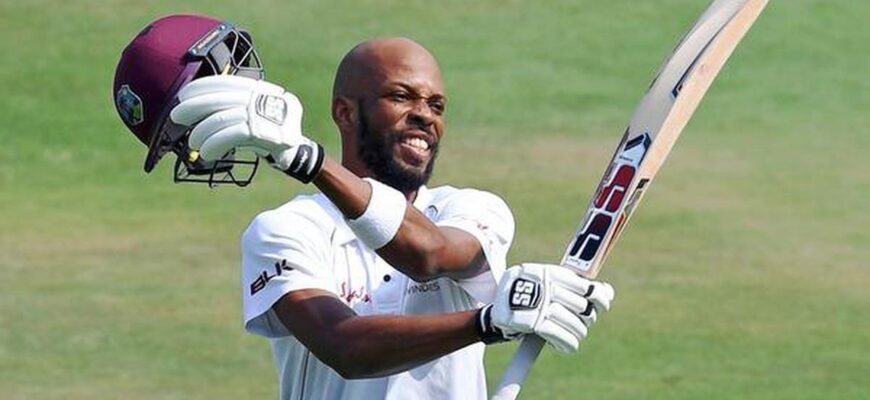The roar of the crowd, the vibrant energy of the Caribbean, and a legacy forged by legends – West Indies cricket once evoked images of invincible power. Yet, recent performances on the global stage paint a starkly different picture. Following a humbling innings defeat to India, cricketer Roston Chase delivered a candid assessment, pointing to a profound “struggle for finances” and persistent “infrastructure problems” as fundamental impediments.
While quick to clarify that these issues are not mere excuses for the team`s dismal run – including five losses in six Test matches this year and a particularly grim 27 all-out against Australia – Chase`s observations offer a critical glimpse into the systemic challenges undermining a once-dominant cricketing nation. The question isn`t just why West Indies are losing, but what hidden currents are pulling them under.
The Echoes of Financial Strain and Neglected Foundations
Chase`s remarks about the lack of financial resources are not new, but they resonate with increased urgency. It`s a truth whispered in many developing cricket nations: without adequate funding, the very foundations of the sport begin to crumble. For the West Indies, this manifests directly in sub-par training facilities.
“I think the systems in the Caribbean are a bit poor in terms of training facilities and stuff,” Chase stated. “But what I would say is yes, there is obviously a struggle in the Caribbean for finances. So whatever help we can get… I hope that we do get it so that we could strengthen the infrastructure for cricket.”
Improved infrastructure isn`t just about glossy stadiums; it`s about reliable practice pitches, modern equipment, and specialist coaching – the very tools required to hone raw talent into world-class ability. When these are lacking, the ripple effect reaches every level of the game, ultimately impacting national team performance.
The Pitches and the Plight of the Batters
One of the more poignant revelations from Chase concerned the very playing surfaces in the Caribbean, which he described as “not really batsman-friendly.” This might sound counter-intuitive – shouldn`t home pitches offer an advantage? Instead, they appear to be creating a developmental handicap for West Indian batsmen.
Chase elaborated on the consequences:
- Low Batting Averages: “Guys don`t really bat for long periods and score those big scores.” The struggle to reach significant individual milestones translates directly into fragile team totals.
- Slow Outfields: “When you hit the ball in the gaps, you probably end up struggling to get two.” This not only frustrates aggressive stroke-play but also conditions batsmen to undervalue traditional scoring methods, making adaptation to faster outfields abroad challenging.
- Lack of Centuries: Recalling a recent series against Australia, Chase noted, “that was the first time I`ve ever played an international series where a batsman never scored a hundred in three matches.” This alarming statistic underscores a deep-seated problem with building substantial innings.
The ironic twist here is that what might seem like a `challenging` home environment for bowlers could, in fact, be stifling the very growth of West Indian batsmen, preventing them from developing the patience, technique, and scoring habits needed for Test cricket success.
The Modern Game`s Dilemma: Loyalty vs. Livelihood
Beyond infrastructure, the West Indies team also grapples with player availability, a common concern in the age of global T20 leagues. Key fast bowlers like Shamar Joseph and Alzarri Joseph are currently sidelined by injuries, and Jason Holder opted out for a planned medical procedure. Chase acknowledged the complex reality:
“A guy is going to try to earn his living. So I can`t really fault a guy for trying to go there and be available for whatever cricket it may be that he`s given the opportunity to play.”
This highlights a fundamental tension: the demanding international schedule combined with the lucrative appeal of franchise cricket means players are constantly balancing national duty with personal economic security. While understandable from an individual perspective, it inevitably impacts team cohesion and strength when top talent is unavailable or fatigued.
A Call for Resilience and Strategic Overhaul
Despite outlining these significant systemic hurdles, Chase maintained that the ultimate responsibility lies with the players. “The onus is on the players to find some way to churn up runs and wickets,” he asserted, emphasizing the need for stronger defence and more consistent partnerships.
The recent defeat to India, where the West Indies failed to bat out a full day or post a competitive total even after winning the toss, serves as a stark reminder. Chase noted the lack of “devils in the wicket” – implying the conditions were playable – yet West Indies gifted wickets too easily. Indian batters, he observed, showed that solid defense and judicious scoring were possible.
Can the Phoenix Rise?
The journey back to cricketing prominence for the West Indies is clearly multifaceted. It requires more than just individual brilliance; it demands a significant overhaul of infrastructure, sustained financial investment, and a strategic approach to player development that accounts for the realities of the modern cricketing landscape. Roston Chase`s frank assessment is a crucial starting point – a call not for excuses, but for a deeper understanding and proactive solutions to nurture the next generation of Caribbean cricketing giants and restore the region`s legendary status in the game.








